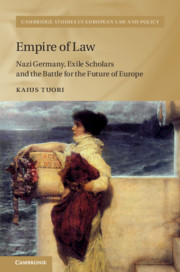Book contents
- Empire of Law
- Cambridge Studies in European Law and Policy
- Empire of Law
- Copyright page
- Dedication
- Contents
- Figures
- Preface
- Abbreviations
- 1 Introduction
- 2 Legal Refugees from Nazi Germany and the Idea of Liberty
- 3 Redefining the Rule of Law, Jurisprudence and the Totalitarian State
- 4 The Long Legal Tradition and the European Heritage in Nazi Germany
- 5 Reconfiguring European Legal Tradition after the War
- 6 The European Narrative and the Tradition of Rights
- 7 Conclusions
- Bibliography
- Index
3 - Redefining the Rule of Law, Jurisprudence and the Totalitarian State
Published online by Cambridge University Press: 23 March 2020
- Empire of Law
- Cambridge Studies in European Law and Policy
- Empire of Law
- Copyright page
- Dedication
- Contents
- Figures
- Preface
- Abbreviations
- 1 Introduction
- 2 Legal Refugees from Nazi Germany and the Idea of Liberty
- 3 Redefining the Rule of Law, Jurisprudence and the Totalitarian State
- 4 The Long Legal Tradition and the European Heritage in Nazi Germany
- 5 Reconfiguring European Legal Tradition after the War
- 6 The European Narrative and the Tradition of Rights
- 7 Conclusions
- Bibliography
- Index
Summary
The third chapter explores the ideas of equality, cosmopolitanism and the rule of law as opposites to Nazi policies. Beginning with Fritz Pringsheim’s article on Hadrian as an example, it analyses how historical cases can be used to present the past as a covert argument against totalitarianism in the present. It juxtaposes Pringsheim’s experience with two contemporaries, Franz Neumann and his theory on the rule of law and the totalitarian state, and Salvatore Riccobono on the fascist idealization of Roman law. By exploring the idea of jurisprudence as a culture of shared values, the chapter investigates the roots of the ideas presented later by David Daube in postwar scholarship, and the origins of the concept of a European legal culture.
- Type
- Chapter
- Information
- Empire of LawNazi Germany, Exile Scholars and the Battle for the Future of Europe, pp. 87 - 123Publisher: Cambridge University PressPrint publication year: 2020

